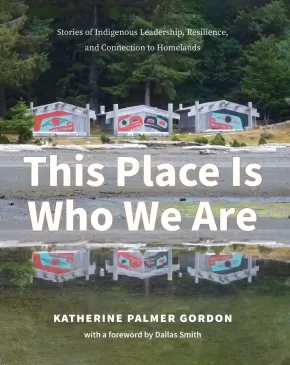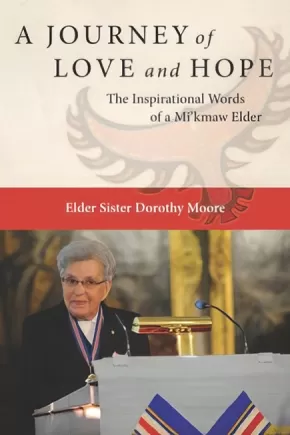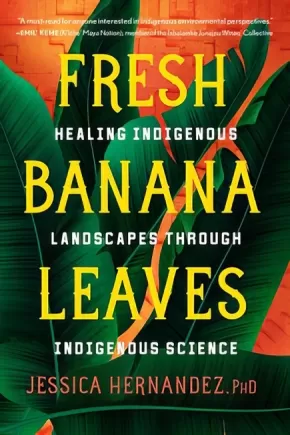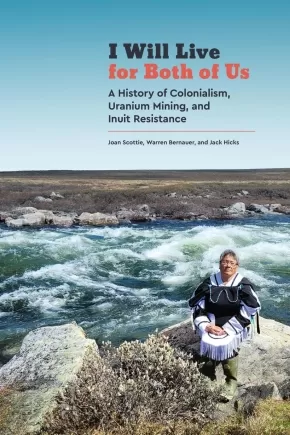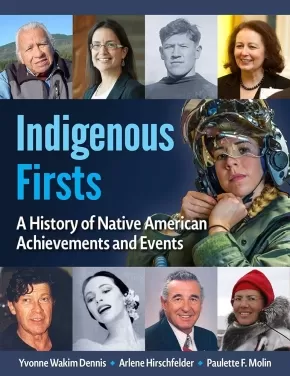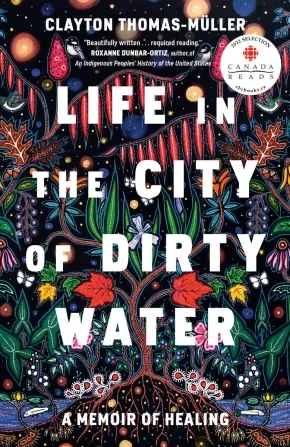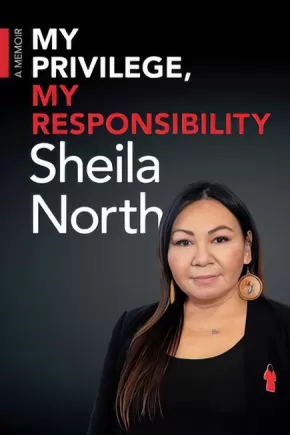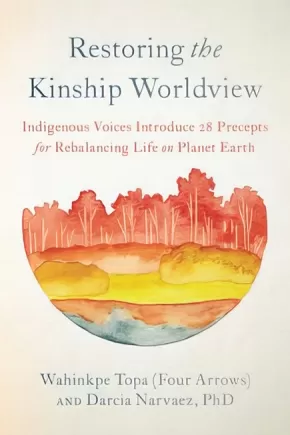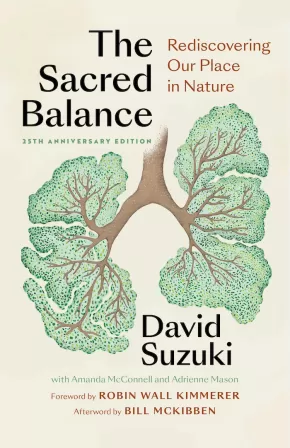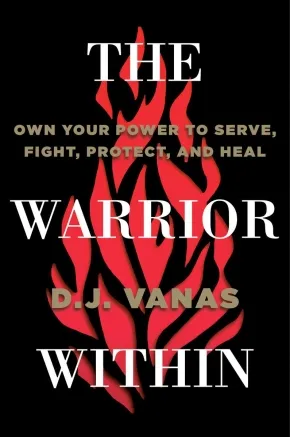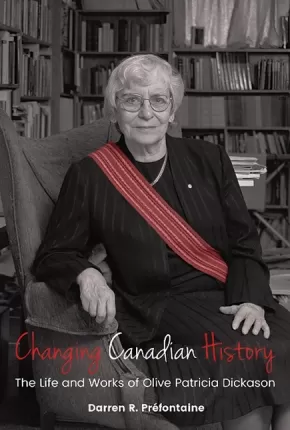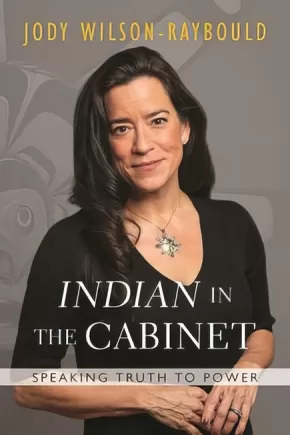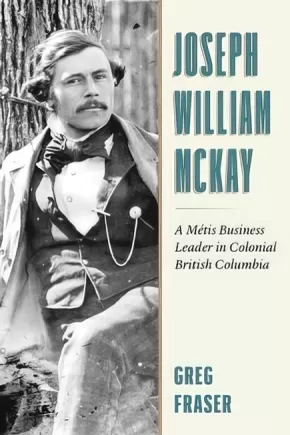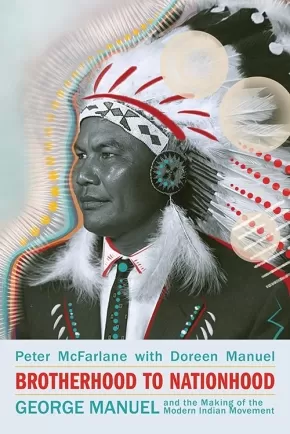
Leadership
16
-
30
of
39 Results;
Sort By
Go To
of 3
This Place Is Who We Are: Stories of Indigenous Leadership, Resilience, and Connection to Homelands
$39.95
Format:
Paperback
Text Content Territories:
Indigenous Canadian; First Nations; Kwakwaka'wakw (Kwakiutl); Ligwilda'wx (Laich-kwil-tach); Wei Wai Kai Nation; Dzwada’enuxw; Haida; Nuxalk (Bella Coola);
Reading Level: N/A
ISBN / Barcode: 9781990776137
Synopsis:
Synopsis:
This Place Is Who We Are profiles Indigenous communities in central and northern coastal BC that are reconnecting to their lands and waters—and growing and thriving through this reconnection.
Indigenous peoples and cultures are integrally connected to the land. Well-being in every sense—physical, social, environmental, economic, spiritual and cultural—depends on that relationship, which is based on a fundamental concept: when the land is well, so are the people.
With increasing strength, Indigenous peoples in this vast region of BC—which spans the homelands of more than two dozen First Nations and one of the largest remaining coastal temperate rainforests in the world—are restoring what has been lost through environmental depredation and healing what has been devastated by colonization.
This volume is a collection of ten of these inspiring stories. X̱aayda voices explain how their Rediscovery camps are healing and empowering their youth; Dzawada̱’enuxw Hereditary Chief Maxwiyalidizi K’odi Nelson shares the story of building a healing centre and ecolodge; Wei Wai Kum Chief Christopher Roberts describes the challenges and opportunities for an urban First Nation looking to prosper while protecting the environment and ancient Ligʷiłdaxʷ history and living cultural values; and many more Indigenous leaders share their own experiences of growth, strength and reconnection.
Thoughtful and inspiring, This Place Is Who We Are illustrates what can be accomplished when conservation and stewardship are inextricably intertwined with the prosperity and well-being of communities.
Reviews
“Katherine Palmer Gordon, a consummate listener, weaves a powerful tapestry of ten First Nations people, deeply grounded in land, memory and story. Their lives honour the inextinguishable inter-connectedness of humans and nature, in righteous defiance of colonization. These are stories that point to an optimistic future based on the teachings of Ancestors and Elders with a view to making the world better for children, grandchildren and children yet to come. To do this, human wellbeing and land protection must be inseparable. This book is an encounter with wonderful people doing wonderful things. This Place is Who We Are is an invitation to hope for a better society, a better world, featuring ten people creating it. I thank the contributors and Katherine Palmer Gordon for engaging in a visionary conversation.” — Shelagh Rogers, O.C. Host/Producer of The Next Chapter, CBC Radio One, Honorary Witness, Trut
“A beautiful collection of stories and lived experiences! Each with gentle and loving reminders of our sacred connections to each other, the land and water and all living beings. Individually, these stories are inspiring, hopeful and thought provoking. As a collection, majestically woven together by Katherine Palmer Gordon, they have the potential to change hearts and minds of readers, decision makers and future generations.” — Monique Gray Smith
“An astute facilitator of Indigenous governmental relationships and reconciliation, Katherine Palmer Gordon is also an award-winning writer, and a very good listener who earns trust. These deeply personal accounts of Indigenous cultural rediscovery, empowerment—and healing in a post-colonial world—are truly inspiring. Steeped in ancient connections with the land, the shared wisdom and vision of elders, youth and community leaders offer timely lessons for a healthier, more respectful relationship between people, wildlife and our planet. This is good medicine for all.” — Mark Forsythe, Co-author of The Trail of 1858: British Columbia's Gold Rush Past and former C
“Katherine Palmer Gordon, a consummate listener, weaves a powerful tapestry of ten First Nations people, deeply grounded in land, memory and story. Their lives honour the inextinguishable inter-connectedness of humans and nature, in righteous defiance of colonization. These are stories that point to an optimistic future based on the teachings of Ancestors and Elders with a view to making the world better for children, grandchildren and children yet to come. To do this, human wellbeing and land protection must be inseparable. This book is an encounter with wonderful people doing wonderful things. This Place is Who We Are is an invitation to hope for a better society, a better world, featuring ten people creating it. I thank the contributors and Katherine Palmer Gordon for engaging in a visionary conversation.” — Shelagh Rogers, O.C. Host/Producer of The Next Chapter, CBC Radio One, Honorary Witness, Trut
“A beautiful collection of stories and lived experiences! Each with gentle and loving reminders of our sacred connections to each other, the land and water and all living beings. Individually, these stories are inspiring, hopeful and thought provoking. As a collection, majestically woven together by Katherine Palmer Gordon, they have the potential to change hearts and minds of readers, decision makers and future generations.” — Monique Gray Smith
“An astute facilitator of Indigenous governmental relationships and reconciliation, Katherine Palmer Gordon is also an award-winning writer, and a very good listener who earns trust. These deeply personal accounts of Indigenous cultural rediscovery, empowerment—and healing in a post-colonial world—are truly inspiring. Steeped in ancient connections with the land, the shared wisdom and vision of elders, youth and community leaders offer timely lessons for a healthier, more respectful relationship between people, wildlife and our planet. This is good medicine for all.” — Mark Forsythe, Co-author of The Trail of 1858: British Columbia's Gold Rush Past and former C
Additional Information
256 pages | 8.00" x 10.00" | Paperback
256 pages | 8.00" x 10.00" | Paperback
A Journey of Love and Hope: The Inspirational Words of a Mi'kmaw Elder
$24.95
Artists:
Format:
Hardcover
Text Content Territories:
Indigenous Canadian; First Nations; Mi'kmaq;
Reading Level: N/A
ISBN / Barcode: 9781774711187
Synopsis:
Synopsis:
The long-awaited collection of talks, presentations, prayers, and ceremonies of renowned Mi'kmaw Elder, human rights activist, and language and culture warrior, Sister Dorothy Moore.
Mi'kmaw Elder Sister Dorothy Moore has spent a lifetime advocating for the rights of her people. As a well-known educator and a survivor of the Shubenacadie Indian Residential School, she has broken down systemic barriers, leading the Mi'kmaq to access all levels of education, and worked tirelessly to reclaim and promote Indigenous ways of knowing and being.
In A Journey of Love and Hope, Sister Dorothy's words are collected in print, as she originally spoke them, for the first time. Included are speeches, talks, presentations, and ceremonies delivered between 1985 and 2015 to universities, government departments, and Indigenous organizations and gatherings. Thematic sections include Culture and Language, Spirituality, Racism, Education, and Prayers and Ceremonies, framed by Ikantek (introductions) from well-known Mi'kmaw writers and educators, as well as an Associate Sister of the Sisters of St Martha.
Sister Dorothy's talks and presentations will inspire and serve to disrupt the dominant narratives of complex Indigenous issues such as colonialism, oppression, racism, and discrimination. A Journey of Love and Hope gives a voice to Mi'kmaw lived experiences and provides a valuable resource for use in schools, postsecondary education institutions, and communities. Her words are an inspiration to all Treaty people.
Features original illustrations by celebrated Mi'kmaw artist Gerald Gloade and appendices, including a complete list of Sister Moore's talks and presentations and a timeline of life events.
Additional Information
184 pages | 6.00" x 9.00" | Hardcover | Colour photo insert
Fresh Banana Leaves: Healing Indigenous Landscapes through Indigenous Science
$23.95
Format:
Paperback
Text Content Territories:
Indigenous Central American; Indigenous Peoples in El Salvador; Maya; Maya Ch'orti' ; Indigenous Peoples in Mexico; Zapotec; Indigenous American;
Reading Level: N/A
ISBN / Barcode: 9781623176051
Synopsis:
Synopsis:
An Indigenous environmental scientist breaks down why western conservationism isn't working--and offers Indigenous models informed by case studies, personal stories, and family histories that center the voices of Latin American women and land protectors.
Despite the undeniable fact that Indigenous communities are among the most affected by climate devastation, Indigenous science is nowhere to be found in mainstream environmental policy or discourse. And while holistic land, water, and forest management practices born from millennia of Indigenous knowledge systems have much to teach all of us, Indigenous science has long been ignored, otherized, or perceived as "soft"--the product of a systematic, centuries-long campaign of racism, colonialism, extractive capitalism, and delegitimization.
Here, Jessica Hernandez--Maya Ch'orti' and Zapotec environmental scientist and founder of environmental agency Piña Soul--introduces and contextualizes Indigenous environmental knowledge and proposes a vision of land stewardship that heals rather than displaces, that generates rather than destroys. She breaks down the failures of western-defined conservatism and shares alternatives, citing the restoration work of urban Indigenous people in Seattle; her family's fight against ecoterrorism in Latin America; and holistic land management approaches of Indigenous groups across the continent.
Through case studies, historical overviews, and stories that center the voices and lived experiences of Indigenous Latin American women and land protectors, Hernandez makes the case that if we're to recover the health of our planet--for everyone--we need to stop the eco-colonialism ravaging Indigenous lands and restore our relationship with Earth to one of harmony and respect.
Despite the undeniable fact that Indigenous communities are among the most affected by climate devastation, Indigenous science is nowhere to be found in mainstream environmental policy or discourse. And while holistic land, water, and forest management practices born from millennia of Indigenous knowledge systems have much to teach all of us, Indigenous science has long been ignored, otherized, or perceived as "soft"--the product of a systematic, centuries-long campaign of racism, colonialism, extractive capitalism, and delegitimization.
Here, Jessica Hernandez--Maya Ch'orti' and Zapotec environmental scientist and founder of environmental agency Piña Soul--introduces and contextualizes Indigenous environmental knowledge and proposes a vision of land stewardship that heals rather than displaces, that generates rather than destroys. She breaks down the failures of western-defined conservatism and shares alternatives, citing the restoration work of urban Indigenous people in Seattle; her family's fight against ecoterrorism in Latin America; and holistic land management approaches of Indigenous groups across the continent.
Through case studies, historical overviews, and stories that center the voices and lived experiences of Indigenous Latin American women and land protectors, Hernandez makes the case that if we're to recover the health of our planet--for everyone--we need to stop the eco-colonialism ravaging Indigenous lands and restore our relationship with Earth to one of harmony and respect.
Reviews
"Westerners, [Dr. Hernandez] writes, fall short on including Indigenous people in environmental dialogues and deny them the social and economic resources necessary to recover from 'land theft, cultural loss, and genocide' and to prepare for the future effects of climate change."—Publishers Weekly
"Westerners, [Dr. Hernandez] writes, fall short on including Indigenous people in environmental dialogues and deny them the social and economic resources necessary to recover from 'land theft, cultural loss, and genocide' and to prepare for the future effects of climate change."—Publishers Weekly
“In Fresh Banana Leaves, Jessica Hernandez weaves personal, historical, and environmental narratives to offer us a passionate and powerful call to increase our awareness and to take responsibility for caring for Mother Earth. A must-read for anyone interested in Indigenous environmental perspectives.”—EMIL’ KEME (K’iche’Maya Nation), member of the Ixbalamke Junajpu Winaq’ Collective
Additional Information
256 pages | 6.00" x 9.00" | Black and white illustrations | Paperback
256 pages | 6.00" x 9.00" | Black and white illustrations | Paperback
I Will Live for Both of Us: A History of Colonialism, Uranium Mining, and Inuit Resistance
$24.95
Format:
Paperback
Text Content Territories:
Indigenous Canadian; Inuit;
Grade Levels: 12; University/College;
ISBN / Barcode: 9780887552656
Synopsis:
Synopsis:
Born at a traditional Inuit camp in what is now Nunavut, Joan Scottie has spent decades protecting the Inuit hunting way of life, most famously with her long battle against the uranium mining industry. Twice, Scottie and her community of Baker Lake successfully stopped a proposed uranium mine. Working with geographer Warren Bernauer and social scientist Jack Hicks, Scottie here tells the history of her community’s decades-long fight against uranium mining.
Scottie's I Will Live for Both of Us is a reflection on recent political and environmental history and a call for a future in which Inuit traditional laws and values are respected and upheld. Drawing on Scottie’s rich and storied life, together with document research by Bernauer and Hicks, their book brings the perspective of a hunter, Elder, grandmother, and community organizer to bear on important political developments and conflicts in the Canadian Arctic since the Second World War.
In addition to telling the story of her community’s struggle against the uranium industry, I Will Live for Both of Us discusses gender relations in traditional Inuit camps, the emotional dimensions of colonial oppression, Inuit experiences with residential schools, the politics of gold mining, and Inuit traditional laws regarding the land and animals. A collaboration between three committed activists, I Will Live for Both of Us provides key insights into Inuit history, Indigenous politics, resource management, and the nuclear industry.
Reviews
“I Will Live for Both of Us is the first-hand account of an incredible woman’s resistance to uranium mining in her region specifically, but it is also a detailed description of the history of colonialism in the Kivalliq region, and the past and present structures that perpetuate colonialism. It shines a light on the critical activism that has been happening in this region over the course of decades.” — Willow Scobie
"I Will Live for Both of Us offers a unique and important contribution to our understanding of the history and contemporary debates around mining in the Canadian North. It foregrounds the voice and activism of an Inuk woman, Joan Scottie, and documents her long struggle against the incursions of uranium mining in the Kivalliq Region of Nunavut. Written accessibly it will appeal to readers interested in the North, Indigenous issues, and industrial development.” — Arn Keeling
Educator Information
Table of Contents
Ch 1: Growing Up on the Land
Ch 2: Qallunaat, Moving to Town, and Going to School
Ch 3: Uranium Exploration, Petitions, and a Court Case
Ch 4: Kiggavik Round One, the Urangesellschaft Proposal
Ch 5: The Nunavut Agreement and Gold Mining Near Baker Lake
Ch 6: Uranium Policy in Nunavut
Ch 7: Kiggavik Round Two, the AREVA Proposal
Ch 8: Protecting the Land and the Caribou
Conclusion
Additional Information
264 pages | 6.00" x 9.00" | Index, Bibliography | Paperback
Indigenous Firsts: A History of Native American Achievements and Events
$50.95
Format:
Paperback
Text Content Territories:
Indigenous American; Alaska Native; Native American;
ISBN / Barcode: 9781578597123
Synopsis:
Synopsis:
A celebration of achievement, accomplishments, and courage!
Native American Medal of Honor recipients, Heisman Trophy recipients, U.S. Olympians, a U.S. vice president, Congressional representatives, NASA astronauts, Pulitzer Prize recipients, U.S. poet laureates, Oscar winners, and more. The first Native magician, all-Native comedy show, architects, attorneys, bloggers, chefs, cartoonists, psychologists, religious leaders, filmmakers, educators, physicians, code talkers, and inventors. Luminaries like Jim Thorpe, King Kamehameha, Debra Haaland, and Will Rogers, along with less familiar notables such as Native Hawaiian language professor and radio host Larry Lindsey Kimura and Cree/Mohawk forensic pathologist Dr. Kona Williams. Their stories plus the stories of 2000 people, events and places are presented in Indigenous Firsts: A History of Native American Achievements and Events, including:
- Suzanne Van Cooten, Ph.D., Chickasaw Nation, the first Native female meteorologist in the country
- Caleb Cheeshahteaumuck, Wampanoag from Martha’s Vineyard, graduate of Harvard College in 1665
- Debra Haaland, the Pueblo of Laguna, U.S. Congresswoman and Secretary of the Interior
- Sam Campos, the Native Hawaiian who developed the Hawaiian superhero Pineapple Man
- Thomas L. Sloan, Omaha, was the first Native American to argue a case before the U.S. Supreme Court
- William R. Pogue, Choctaw, astronaut
- Johnston Murray, Chickasaw, the first person of Native American descent to be elected governor in the United States, holding the office in Oklahoma from 1951 to 1955
- The Cherokee Phoenix published its first edition February 21, 1828, making it the first tribal newspaper in North America and the first to be published in an Indigenous language
- The National Native American Honor Society was founded by acclaimed geneticist Dr. Frank C. Dukepoo , the first Hopi to earn a Ph.D.
- Louis Sockalexis, Penobscot, became the first Native American in the National Baseball League in 1897 as an outfielder with the Cleveland Spiders
- Jock Soto, Navajo/Puerto Rican, the youngest-ever man to be the principal dancer with the New York City Ballet
- The Seminole Tribe of Florida was the first Nation to own and operate an airplane manufacturing company
- Warrior's Circle of Honor, the National Native American Veterans Memorial in Washington, DC, on the grounds of the Smithsonian’s National Museum of the American Indian
- The Iolani Palace, constructed 1879–1882, the home of the Hawaiian royal family in Honolulu
- Loriene Roy, Anishinaabe, White Earth Nation, professor at the University of Texas at Austin’s School of Information, former president of the American Library Association
- Ben Nighthorse Campbell, Northern Cheyenne, U.S. representative and U.S. senator from Colorado
- Hanay Geiogamah, Kiowa /Delaware, founded the American Indian Theatre Ensemble
- Gerald Vizenor, White Earth Nation, writer, literary critic, and journalist for the Minneapolis Tribune
- Ely S. Parker (Hasanoanda, later Donehogawa), Tonawanda Seneca, lieutenant colonel in the Union Army, serving as General Ulysses S. Grant’s military secretary
- Fritz Scholder, Luiseno, painter inducted into the California Hall of Fame
- The Native American Women Warriors, the first all Native American female color guard
- Lori Arviso Alvord, the first Navajo woman to become a board-certified surgeon
- Kay “Kaibah” C. Bennett, Navajo, teacher, author, and the first woman to run for the presidency of the Navajo Nation
- Sandra Sunrising Osawa, Makah Indian Nation, the first Native American to have a series on commercial television
- The Choctaw people’s 1847 donation to aid the Irish people suffering from the great famine
- Otakuye Conroy-Ben, Oglala Lakota, first to earn an environmental engineering Ph.D. at the University of Arizona
- Diane J. Willis, Kiowa, former President of the Society of Pediatric Psychology and founding editor of the Journal of Pediatric Psychology
- Shelly Niro, Mohawk, winner of Canada’s top photography prize, the Scotiabank Photography Award
- Loren Leman, Alutiiq/Russian-Polish, was the first Alaska Native elected lieutenant governor
- Kim TallBear, Sisseton-Wahpeton Oyate, the first recipient of the Canada Research Chair in Indigenous Peoples, Technoscience, and Environment
- Carissa Moore, Native Hawaiian, won the Gold Medal in Surfing at the 2020 Tokyo Olympics
- Will Rogers, Cherokee, actor, performer, humorist was named the first honorary mayor of Beverly Hills
Foods of the Southwest Indian Nations by Lois Ellen Frank, Kiowa, was the first Native American cookbook to win the James Beard Award - Diane Humetewa, Hopi, nominated by President Barack Obama, became the first Native American woman to serve as a federal judge
- Susie Walking Bear Yellowtail, Crow, the first Native American nurse to be inducted into the American Nursing Association Hall of Fame
Indigenous Firsts honors the ongoing and rich history of personal victories and triumphs, and with more than 200 photos and illustrations, this information-rich book also includes a helpful bibliography and an extensive index, adding to its usefulness. This vital collection will appeal to anyone interested in America’s amazing history and its resilient and skilled Indigenous people.
Additional Information
496 pages | 7.19" x 9.18" | Paperback
Life in the City of Dirty Water: A Memoir of Healing (PB)
$19.95
Format:
Paperback
Text Content Territories:
Indigenous Canadian; First Nations; Cree (Nehiyawak); Swampy Cree ; Mathias Colomb First Nation;
ISBN / Barcode: 9780735240087
Synopsis:
Synopsis:
An electrifying memoir that braids together the urgent issues of Indigenous rights and environmental policy, from a nationally and internationally recognized activist and survivor.
There have been many Clayton Thomas-Mullers: The child who played with toy planes as an escape from domestic and sexual abuse, enduring the intergenerational trauma of Canada's residential school system; the angry youngster who defended himself with fists and sharp wit against racism and violence, at school and on the streets of Winnipeg and small-town British Columbia; the tough teenager who, at 17, managed a drug house run by members of his family, and slipped in and out of juvie, operating in a world of violence and pain.
But behind them all, there was another Clayton: the one who remained immersed in Cree spirituality, and who embraced the rituals and ways of thinking vital to his heritage; the one who reconnected with the land during summer visits to his great-grandparents' trapline in his home territory of Pukatawagan in northern Manitoba.
And it's this version of Clayton that ultimately triumphed, finding healing by directly facing the trauma that he shares with Indigenous peoples around the world. Now a leading organizer and activist on the frontlines of environmental resistance, Clayton brings his warrior spirit to the fight against the ongoing assault on Indigenous peoples' lands by Big Oil.
Tying together personal stories of survival that bring the realities of the First Nations of this land into sharp focus, and lessons learned from a career as a frontline activist committed to addressing environmental injustice at a global scale, Thomas-Muller offers a narrative and vision of healing and responsibility.
Reviews
“Clayton Thomas-Müller—Cree poet and environmental warrior dedicated to decolonization—has crafted an awesome, lyrical memoir that captures the experiences of urban Indigenous youth facing poverty, drugs, alcohol, domestic violence, and juvenile detention. Most, like Clayton, inherited the intergenerational trauma of residential schools. Clayton found a way to escape trauma and poverty in order to fight for his people. This beautifully written book is required reading for everyone who cares about justice for the survivors of genocide who continue to survive in colonized conditions. It offers a path to liberation that may also be the way to saving the earth and humanity itself.” — Roxanne Dunbar-Ortiz, author of An Indigenous Peoples’ History of the United States
“This book is an adventure story in every way. A life of drug dealers and crackhouses and guns; leaving that behind for a remarkable time of spiritual and personal growth; and there’s the ongoing adventure of working desperately to protect the planet and its sacred places. Clayton Thomas-Müller relates these adventures in ways that will help everyone through unfamiliar terrain—he’s a trustworthy guide and an authentic storyteller. In a moment when Indigenous people around the world are coming to the very fore of the most crucial fights, this volume will broaden your understanding in powerful ways. And you won’t forget its scenes any time soon.”—Bill McKibben, co-founder of 350.org and author of Earth and Oil and Honey
Additional Information
240 pages | 5.19" x 7.97" | Paperback
My Privilege, My Responsibility: A Memoir
$24.95
Format:
Paperback
Text Content Territories:
Indigenous Canadian; First Nations; Cree (Nehiyawak); Woodland Cree; Rocky Cree; Bunibonibee Cree Nation ;
Reading Level: N/A
ISBN / Barcode: 9781773370668
Synopsis:
Synopsis:
In September 2015, Sheila North was declared the Grand Chief of Manitoba Keewatinowi Okimakanak (MKO), the first woman elected to the position. Known as a “bridge builder”, North is a member of Bunibonibee Cree Nation. North’s work in advocacy journalism, communications, and economic development harnessed her passion for drawing focus to systemic racism faced by Indigenous women and girls. She is the creator of the widely used hashtag #MMIW. In her memoir, Sheila North shares the stories of the events that shaped her, and the violence that nearly stood in the way of her achieving her dreams. Through perseverance and resilience, she not only survived, she flourished.
Additional Information
232 pages | 6.00" x 9.00" | Paperback
Namwayut - We Are All One: A Pathway to Reconciliation
$29.95
Format:
Hardcover
ISBN / Barcode: 9781774580059
Synopsis:
Synopsis:
We all share a common humanity. No matter how long or difficult the path ahead, we are all one.
Reconciliation belongs to everyone. In this profound book, Chief Robert Joseph, globally recognized peacebuilder and Hereditary Chief of the Gwawaenuk People, traces his journey from his childhood surviving residential school to his present-day role as a leader who inspires individual hope, collective change, and global transformation.
Before we get to know where we are going, we need to know where we came from. Reconciliation represents a long way forward, but it is a pathway toward our higher humanity, our highest selves, and an understanding that everybody matters. In Namwayut, Chief Joseph teaches us to transform our relationships with ourselves and each other. As we learn about, honour, and respect the truth of the stories we tell, we can also discover how to dismantle the walls of discrimination, hatred, and racism in our society.
Chief Joseph is known as one of the leading voices on peacebuilding in our time, and his dedication to reconciliation has been recognized with multiple honorary degrees and awards. As one of the remaining first-language speakers of Kwak'wala, his wisdom is grounded in Indigenous ways of knowing while making space for something bigger and better for all of us.
Additional Information
200 pages | 5.25" x 8.00" | Hardcover
Restoring the Kinship Worldview: Indigenous Voices Introduce 28 Precepts for Rebalancing Life on Planet Earth
$28.95
Format:
Paperback
Text Content Territories:
Indigenous American; Native American; Indigenous;
Reading Level: N/A
ISBN / Barcode: 9781623176426
Synopsis:
Synopsis:
Selected speeches from Indigenous leaders around the world--necessary wisdom for our times, nourishment for our collective, and a path away from extinction toward a sustainable, interconnected future.
Indigenous worldviews, and the knowledge they confer, are critical for human survival and the wellbeing of future generations. Editors Wahinkpe Topa (Four Arrows) and Darcia Narvaez present 28 powerful excerpted passages from Indigenous leaders, including Mourning Dove, Robin Wall Kimmerer, Winona LaDuke, and Xiuhtezcatl Martinez. Accompanied by the editors’ own analyses, each chapter reflects the wisdom of Indigenous worldview precepts like:
• Egalitarian rule versus hierarchical governance
• A fearless trust in the universe, instead of a fear-based culture
• The life-sustaining role of ceremony
• Emphasizing generosity and the greater good instead of pursuing selfish goals and for personal gain
• The laws of nature as the highest rules for living
The editors emphasize our deep need to move away from the dominant Western paradigm--one that dictates we live without strong social purpose, fails to honor the earth as sacred, leads with the head while ignoring the heart, and places individual “rights” over collective responsibility. Restoring the Kinship Worldview is rooted in an Indigenous vision and strong social purpose that sees all life forms as sacred and sentient--that honors the wisdom of the heart, and grants equal standing to rights and responsibilities.
Inviting readers into a world-sense that expands beyond perceiving and conceiving to experiencing and being, Restoring the Kinship Worldview is a salve for our times, a nourishment for our collective, and a holistic orientation that will lead us away from extinction toward an integrated, sustainable future.
Reviews
“Humans have a particular ecological niche, a role as the custodial species of this earth. We must return our species to this niche within the next decade, or perish. This book is a perfect place to start—the foundation is good relations, making kin both human and nonhuman—and here we have story from a gathering of some of the finest Indigenous thinkers on the planet. Four Arrows and Darcia Narvaez have a particular way of bringing the right people together for such purposes.” —TYSON YUNKAPORTA, author of Sand Talk, senior research fellow at Deacon University, woodcarver, and poet
“Mahalo Four Arrows and Darcia Narvaez for this collection, this eloquence and grace through time so we can recognize and honor the common sense and purpose of continuity. All of it is needed now. We are all meant to wake up together.” —MANULANI ALULI MEYER, director of Indigenous education, University of Hawai‘i–West O‘ahu
“Darcia Narvaez and Four Arrows have gathered an inspiring pastiche of wise Native American voices woven together by their own insightful and heartfelt dialogues to gift us with an invaluable bundle of tenets and templates for the urgent project of decolonizing and rewilding our minds and communities.” —BILL PLOTKIN, PhD, author of Soulcraft, Wild Mind, and The Journey of Soul Initiation
Additional Information
336 pages | 6.00" x 8.95" | Paperback
The Sacred Balance: Rediscovering Our Place in Nature - 25th Anniversary Edition
$26.95
Format:
Paperback
Text Content Territories:
Indigenous;
Reading Level: N/A
ISBN / Barcode: 9781771649865
Synopsis:
Synopsis:
“The Sacred Balance has a beautiful spirit.”—E.O. Wilson
With a new foreword from Robin Wall Kimmerer, New York Times-bestselling author of Braiding Sweetgrass—and an afterword from Bill McKibben—this special 25thanniversary edition of a beloved bestseller invites readers to see ourselves as part of nature, not separate.
The world is changing at a relentless pace. How can we slow down and act from a place of respect for all living things? The Sacred Balance shows us how.
In this extensively updated new edition, David Suzuki reflects on the increasingly radical changes in science and nature—from the climate crisis to peak oil and the rise in clean energy—and examines what they mean for humankind. He also reflects on what we have learned by listening to Indigenous leaders, whose knowledge of the natural world is profound, and whose peoples are on the frontlines of protecting land and water around the world.
Drawing on his own experiences and those of others who have put their beliefs into action, The Sacred Balance combines science, philosophy, spirituality, and Indigenous knowledge to offer concrete suggestions for creating an ecologically sustainable future by rediscovering and addressing humanity’s basic needs.
Additional Information
336 pages | 8.50" x 5.50" | Paperback
The Warrior Within: Own Your Power to Serve, Fight, Protect, and Heal
$39.00
Format:
Hardcover
Text Content Territories:
Indigenous American; Native American;
Reading Level: N/A
ISBN / Barcode: 9780593423011
Synopsis:
Synopsis:
A transformational guide to getting yourself right in order to accomplish the work you were meant to do, from speaker, former U.S. Air Force officer, and member of the Ottawa tribe D.J. Vanas.
When faced with an important job, and people depending on you to do it, most of us will give and give until there’s nothing left. But running on empty, even for a worthy cause, only sets you up for failure in the long run. To persevere on the path to success requires more than sheer fearlessness and willpower. It requires what D.J. Vanas calls the warrior spirit, the kind of strength that looks outward but comes from deep within.
Drawing inspiration from Native American philosophy and tradition, The Warrior Within outlines a new model for personal power in the face of overwhelming chaos. A true warrior is not the toughest or bravest person in the room. A true warrior is committed to self-mastery, knows how to navigate change and disruption, transforms setbacks into opportunities for achievement, refuses to quit, and most importantly, always fights for something bigger than the self. With a vast array of stories and examples, from vision quests to treacherous hikes to veterans and service providers at the front lines, Vanas shows how to apply these principles to transform how you show up both for yourself and those around you.
More than an empowerment manual, The Warrior Within is a call to accomplish the world-changing work you were meant for by tapping into the power of the warrior spirit.
Reviews
"The powerful lessons imparted in these chapters will inspire strength, confidence and motivation, so that you can deliver your best in the worst of circumstances—while keeping your sanity and health! I encourage every healthcare giver to read The Warrior Within, for they truly serve, fight, protect and heal every day, often at their own expense."--LeAnn Thieman, author of the Chicken Soup for Nurse’s Soul series and founder of SelfCare for HealthCare®
"I highly recommend The Warrior Within! Through great storytelling, D.J. Vanas shares an often overlooked element of leadership ... taking care of yourself. Our beautiful Anishinaabe teachings emphasize balance in all things. Being a warrior means recognizing your needs and honoring your gifts. Way to go, D.J.!"--Angeline Boulley (Sault Ste. Marie Tribe of Chippewa Indians) New York Times bestselling author of Firekeeper's Daughter
"D.J. Vanas inspires us to find our ‘warrior spirit’ of courage, perseverance, resilience, and teamwork in life’s most fearful times. Your heart will soar like an eagle as you read how ordinary heroes use this inner strength to serve others—and how we can learn to do the same.”--Joseph Pfeifer, FDNY Assistant Chief, retired, author of Ordinary Heroes
“This is it: the book I’ve been waiting for! There isn’t another on the market that applies indigenous principles and ideas in order to expose the warrior in you. A comprehensive, compelling, emotional and amazingly insightful book. I couldn’t put it down. I wish I had this book years ago!"--Juanita Mullen (Seneca), AI/AN Veterans Liaison, Department of Veterans Affairs
“DJ Vanas describes a life of leading and doing through Indigenous identity and values. Combining his personal story with advice, The Warrior Within is more than a leadership book. It is a story of living a life of abundance and rich relationships, with DJ as your terrific guide.”-Cheryl Crazy Bull, President & CEO, American Indian College Fund
Additional Information
256 pages | 5.72" x 8.57" | Hardcover
Changing Canadian History: The Life and Works of Olive Patricia Dickason
$30.00
Format:
Paperback
Text Content Territories:
Indigenous Canadian; Métis;
Reading Level: N/A
ISBN / Barcode: 978-1-926795-84-3
Synopsis:
Synopsis:
For six decades, Olive Dickason was a remarkable contributor to Canadian public life. An award-winning journalist, influential academic, and respected human rights advocate, her life was a triumph over seemingly impossible obstacles. These many impediments include having a childhood marked by poverty; being forced, as a single working mother, to place her three daughters in foster care for several years; working as a female journalist in the sexist, “Mad Men” era of the 1950s and ‘60s; giving up a successful journalism career to obtain a doctorate in Indigenous history; arguing successfully with the university establishment on whether or not Indigenous peoples had history; and taking her fight against mandatory retirement all the way to the Supreme Court. Olive Dickason faced these challenges with determination and dignity and was an inspiration for all who knew her. Changing Canadian History: The Life and Works of Olive Patricia Dickason is the first full-length biography of this trailblazing icon who forever changed how Indigenous history is viewed in Canada.
Reviews
“Olive Dickason pushed the boundaries of sexism, racism, and ageism, defying colonial narratives upheld by patriarchal systems.”—Dr. Cindy Gaudet, Campus Saint-Jean, University of Alberta
“A biography of a brilliant woman who forged entry into Canadian cultural and intellectual institutions by sheer force of determination.”—Dr. Allyson Stevenson, Gabriel Dumont Institute Chair, Métis Studies
Educator Information
This book is the first biography of this trailblazing icon who forever changed how Indigenous history is viewed in Turtle Island and beyond. Based on years of meticulous research, this work provides readers with an engaging and thought-provoking read about this iconic academic who helped define a discipline.
Additional Information
445 Pages
Indian in the Cabinet: Speaking Truth to Power
$34.99
Format:
Hardcover
Text Content Territories:
Indigenous Canadian; First Nations; Kwakwaka'wakw (Kwakiutl); Musgamagw Tsawataineuk; Ligwilda'wx (Laich-kwil-tach); We Wai Kai Nation;
Reading Level: N/A
ISBN / Barcode: 9781443465366
Synopsis:
Synopsis:
A compelling political memoir of leadership and speaking truth to power by one of the most inspiring women of her generation.
Jody Wilson-Raybould was raised to be a leader. Inspired by the example of her grandmother, who persevered throughout her life to keep alive the governing traditions of her people, and raised as the daughter of a hereditary chief and Indigenous leader, Wilson-Raybould always knew she would take on leadership roles and responsibilities. She never anticipated, however, that those roles would lead to a journey from her home community of We Wai Kai in British Columbia to Ottawa as Canada’s first Indigenous Minister of Justice and Attorney General in the Cabinet of then newly elected prime minister, Justin Trudeau.
Wilson-Raybould’s experience in Trudeau’s Cabinet reveals important lessons about how we must continue to strengthen our political institutions and culture, and the changes we must make to meet challenges such as racial justice and climate change. As her initial optimism about the possibilities of enacting change while in Cabinet shifted to struggles over inclusivity, deficiencies of political will, and concerns about adherence to core principles of our democracy, Wilson-Raybould stood on principle and, ultimately, resigned. In standing her personal and professional ground and telling the truth in front of the nation, Wilson-Raybould demonstrated the need for greater independence and less partisanship in how we govern.
"Indian” in the Cabinet: Speaking Truth to Power is the story of why Wilson-Raybould got into federal politics, her experience as an Indigenous leader sitting around the Cabinet table, her proudest achievements, the very public SNC-Lavalin affair, and how she got out and moved forward. Now sitting as an Independent Member in Parliament, Wilson-Raybould believes there is a better way to govern and a better way for politics—one that will make a better country for all.
Additional Information
352 pages | 6.00" x 9.00" | Hardcover
Joseph William McKay: A Metis Business Leader in Colonial British Columbia
$22.95
Format:
Paperback
Text Content Territories:
Indigenous Canadian; Métis;
Reading Level: N/A
ISBN / Barcode: 9781772033403
Synopsis:
Synopsis:
An intriguing look at the accomplishments and contradictions of Joseph William McKay, best known as the founder of Nanaimo, BC, and one of the most successful Métis men to rise through the ranks of the Hudson’s Bay Company in the late nineteenth century.
When examining the history of British Columbia, one would be hard-pressed to find an Indigenous person who so successfully navigated the echelons of colonial power as did Joseph William McKay (1829–1900). McKay was Métis, born in Quebec, and began his career in Oregon during the dispute over the international boundary in 1845–46. After moving north, he met his mentor James Douglas and, at age twenty-three, was given the job of building the city of Nanaimo from the ground up and establishing its coal mines.
McKay made several exploratory trips with Douglas during the Gold Rush, and he surveyed the route for the Overland Telegraph, which ran throughout BC. He rose through the ranks of the Hudson’s Bay Company, eventually earning the appointment of Chief Factor, the company’s highest rank. This was at a time when few Indigenous employees of HBC were permitted to rise beyond the rank of postmaster.
After leaving the company in 1878, McKay began a second career in the Department of Indian Affairs. He was a federal Indian Agent and later the Assistant Commissioner of Indian Affairs for British Columbia. A product of his time who had found personal success working within the colonial system, McKay is a complicated figure when viewed through a twenty-first-century lens. He advocated on behalf of Indigenous Peoples when he tried to prevent the trespass of CPR crews and European settlers on their ancestral land. Between 1886 and 1888, he personally inoculated more than a thousand Indigenous people with the smallpox vaccine. Yet, he also participated in a system that did untold harm to First Nations, Métis, and Inuit people. This fascinating new biography sheds light on an accomplished and complex man.
Additional Information
224 pages | 6.00" x 9.00" | B&W Photo Sections | Paperback
Brotherhood to Nationhood: George Manuel and the Making of the Modern Indian Movement
$32.95
Format:
Paperback
Text Content Territories:
Indigenous Canadian; First Nations; Salish; Interior Salish; Secwepemc (Shuswap);
ISBN / Barcode: 9781771135108
Synopsis:
Synopsis:
Charged with fresh material and new perspectives, this updated edition of the groundbreaking biography From Brotherhood to Nationhood brings George Manuel and his fighting tradition into the present.
George Manuel (19201989) was the strategist and visionary behind the modern Indigenous movement in Canada. A three-time Nobel Peace Prize nominee, he laid the groundwork for what would become the Assembly of First Nations and was the founding president of the World Council of Indigenous Peoples. Authors Peter McFarlane and Doreen Manuel follow him on a riveting journey from his childhood on a Shuswap reserve through three decades of fierce and dedicated activism.
In these pages, an all-new foreword by celebrated Mi'kmaq lawyer and activist Pam Palmater is joined by an afterword from Manuel’s granddaughter, land defender Kanahus Manuel. This edition features new photos and previously untold stories of the pivotal roles that the women of the Manuel family played and continue to play in the battle for Indigenous rights.
Reviews
“Brotherhood to Nationhood is more than just a biography of the life of George Manuel; it demonstrates the roots of an Indigenous internationalism and political theory that is grounded in the ethics, knowledge, and practices of the Secwepemc people.” – Leanne Betasamosake Simpson, author of As We Have Always Done
Educator Information
Table of Contents
Foreword - Dr. Pamela Palmater
Preface - Peter McFarlane
Preface - Doreen Manuel
Part I. The Neck of the Chicken
1. Paradise, Paradise Lost, 1960
2. The Hard-Luck Shuswap Kid, 1920–1932
3. White Plague, Red Victims, 1932–1954
4. Local Agitator to Provincial Leader, 1955–1960
5. A Future for Your Children, 1960–1963
Part II. Building the National Movement
6. Community Development and the Arthur Laing Gang, 1965–1967
7. Down the Garden Path: Chretien Andras Consultations, 1968–1969
8. From White Paper to Red Paper, 1969–1970
9. The National Chief
10. The National Indian Philosophy, 1971–1972
Part III. Indian Shogun
11. International Travels
12. Land Title and the James Bay Battle, 1972–1973
13. Red Power
14. Political Eruptions in British Columbia, 1975
15. A Voice for the Fourth World, 1975–1976
16. Back to British Columbia,1976–1977
17. The Peoples’ Movement, 1977–1979
18. Constitutional Express, 1980
Part IV. Final Days
19. European Express, 1981–1982
20. Passing the Torch, 1982–1989
Epilogue
Afterword - Kanahus Manuel
Additional Information
402 pages | 6.00" x 9.00" | Revised, 2nd Edition
Sort By
Go To
of 3

